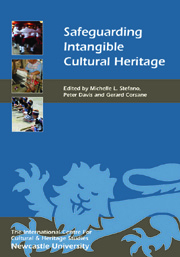Book contents
- Frontmatter
- Contents
- List of Illustrations
- Acknowledgments
- Touching the Intangible: An Introduction
- NEGOTIATING AND VALUING THE INTANGIBLE
- APPLYING THE INTANGIBLE CULTURAL HERITAGE CONCEPT
- 8 Reflections on the Implementation of the UNESCO 2003 Convention for the Safeguarding of Intangible Cultural Heritage in France
- 9 Government and Intangible Heritage in Australia
- 10 Proud to be Dutch? Intangible Heritage and National Identity in the Netherlands
- 11 Intangible Cultural Heritage in Wales
- 12 Conversation Piece: Intangible Cultural Heritage in Botswana
- 13 The UNESCO Convention for the Safeguarding of Intangible Cultural Heritage and its Implications for Sustaining Culture in Nova Scotia
- ON THE GROUND: SAFEGUARDING THE INTANGIBLE
- List of Contributors
- Index
8 - Reflections on the Implementation of the UNESCO 2003 Convention for the Safeguarding of Intangible Cultural Heritage in France
from APPLYING THE INTANGIBLE CULTURAL HERITAGE CONCEPT
Published online by Cambridge University Press: 05 February 2013
- Frontmatter
- Contents
- List of Illustrations
- Acknowledgments
- Touching the Intangible: An Introduction
- NEGOTIATING AND VALUING THE INTANGIBLE
- APPLYING THE INTANGIBLE CULTURAL HERITAGE CONCEPT
- 8 Reflections on the Implementation of the UNESCO 2003 Convention for the Safeguarding of Intangible Cultural Heritage in France
- 9 Government and Intangible Heritage in Australia
- 10 Proud to be Dutch? Intangible Heritage and National Identity in the Netherlands
- 11 Intangible Cultural Heritage in Wales
- 12 Conversation Piece: Intangible Cultural Heritage in Botswana
- 13 The UNESCO Convention for the Safeguarding of Intangible Cultural Heritage and its Implications for Sustaining Culture in Nova Scotia
- ON THE GROUND: SAFEGUARDING THE INTANGIBLE
- List of Contributors
- Index
Summary
INTRODUCTION
For the past decade a team of French anthropologists have worked together under the auspices of the Ministry of Culture in the Laboratoire d'anthropologie et d'histoire de l'institution de la culture (LAHIC) and successfully developed numerous research studies on the anthropology of heritage – that is, the study of heritage objects and policies using the tools of anthropology. These efforts have contributed to a better understanding of the relationship that local inhabitants have with historical sites, the role of archaeology in society and the history and evolution of social history museums. Research has also led to seminars on ‘heritage emotions’, the collective responses to the danger and/or damage to monuments (Fabre 2000; Voisenat 2008; LAHIC 2010a; Fabre and Iuso 2010). One area that appears to have been largely ignored is the attitude of heritage professionals to their work within the sector, often framed within the language and ideals of ‘projects’ and ‘assessments’; this is equally true for emerging concerns about intangible cultural heritage (hereafter ICH).
With respect to ICH, new possibilities have emerged from the fact that the 2003 Convention gives heritage bearers, as opposed to heritage professionals, a pivotal role in its safeguarding. Professionals and scholars must define for themselves new attitudes and outlooks that differ from the more conventional ways in which heritage has been preserved, particularly at the national level. New strategies are required, differing from the traditional museum-based paradigm of preserving, interpreting and displaying heritage, particularly as the 2003 Convention sheds new light on forms of heritage that, up until now, have been given little attention by the policies of States Parties.
- Type
- Chapter
- Information
- Safeguarding Intangible Cultural Heritage , pp. 95 - 110Publisher: Boydell & BrewerPrint publication year: 2012



